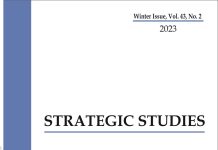Abstract:
The 1974 multilateral Nuclear Suppliers Group (NSG), an integral part of the nuclear non-proliferation regime, is aimed at ensuring that nuclear trade is consistent with global non-proliferation norms. Although the NSG is a voluntary and consensus based arrangement, granting country-specific exceptions, waivers and memberships, could undermine the Group’s credibility. Allowing nuclear trade, based on political and commercial interests only to favourable countries, and denial to weaker and developing states, could seriously erode the trust in nuclear non-proliferation regime. Eventually, deprived states will acquire nuclear technology through clandestine which could be diverted for weapons development. Instead of denial of their “inalienable” right, the international community should accommodate these states for peaceful nuclear trade. A non-discriminatory criteria-based approach of NSG membership can help pacify these concerns as it would be equally helpful to accommodate non-nuclear weapon states (NNWS), and nuclear weapon states, outside the domain of Nuclear Non-Proliferation Treaty (NPT). Pakistan, who has emerged as a responsible nuclear weapon state, is equally interested in nuclear trade purely for peaceful purposes, and supports an equal approach for its entry to the NSG. In this regard, the purpose of this study is to analyse the implications of country-specific approach and highlight the need for a non-discriminatory criteria-based approach of the NSG membership. The study argues that a criteria-based approach could help developing countries, including Pakistan, to overcome their growing energy shortages by utilising peaceful nuclear trade. This engagement will also broaden the support for the international nuclear non-proliferation regime.












